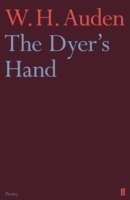The Dyer's Hand

Editorial Faber & Faber
Fecha de edición septiembre 2012 · Edición nº 1
Idioma inglés
EAN 9780571283507
108 páginas
Libro
encuadernado en tapa blanda
Resumen del libro
In the early 1950s Auden began planning a prose volume that would bring together some of his published essays, lectures, and reviews, together with newly-written notes and aphorisms. In 1956 he was elected Professor of Poetry at Oxford, and "The Dyer's Hand" appeared in 1962, combining earlier material with revised versions of many of his Oxford lectures: the result is one of Auden's most original works, his only book of prose devised as a single cohesive work about disparate subjects, and containing - as he remarked at the time - 'all the autobiography I am willing to make public'. "Speaking for myself, the questions which interest me most when reading a poem are two.
The first is technical: "Here is a verbal contraption. How does it work?" The second is, in the broadest sense, moral: "What kind of a guy inhabits this poem? What is his notion of the good life or the good place? His notion of the Evil One? What does he conceal from the reader? What does he conceal even from himself?"" (W. H.
Auden (inaugural lecture as Professor of Poetry at Oxford, June 1956)).
Biografía del autor
x{0026}lt;P x{0026}lt;B W. H. Audenx{0026}lt;/B nació en la ciudad inglesa de York en 1907. Estudió en el Christ Church de Oxford, donde coincidió con otros escritores como Stephen Spender, Louis MacNeice o Christopher Isherwood. En 1930, su libro x{0026}lt;I Poems x{0026}lt;/I sentó las bases de su prestigio como una de las voces más originales y contundentes de su generación. Durante la década de los años treinta del siglo XX, viajó por Alemania, Islandia, China y España, donde fue testigo de la guerra civil española. En 1939 abandonó Europa y se trasladó a Estados Unidos, país del que adquirió la nacionalidad y en el que conoció a Chester Kallman, su compañero de toda la vida, y cambió de piel ideológica y estilística: del socialismo y el psicoanálisis regresó a las preocupaciones cristianas y teológicas. En 1948 recibió el Premio Pulitzer de poesía y, en 1956, ganó el National Book Award. Ese mismo año fue nombrado profesor de poesía en Oxford, ciudad a la que finalmente regresó en 1970. Murió en Viena en 1973.x{0026}lt;/P








